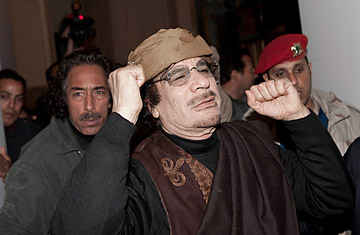
Libyan leader Muammar Gaddafi arrives for a television interview in Tripoli on March 8, 2011
It has become virtually an article of faith among America's chattering class that the Western intervention in Libya cannot be considered a success unless Muammar Gaddafi is removed from power. Reacting to President Obama's speech on Libya last week, CNN's Eliot Spitzer said, "If ... we begin to pull back militarily, that is a very dicey political proposition for the President, to withdraw until we have gotten that moment of clear success, the elimination of Gaddafi." On PBS NewsHour last Friday, the liberal columnist Mark Shields declared, "Any mission that ends or is completed with Gaddafi still in effective control of Libya is a failure." Republican Senator John McCain of Arizona says of Gaddafi that "the longer he stays in power, the more dangerous he becomes." Another Republican Senator, Florida's Marco Rubio, wants any Senate resolution backing the use of force in Libya to stipulate that "removing Muammar Gaddafi from power is in our national interest and ... authorize the President to accomplish that goal."
From the start of the Libyan crisis, Obama has expressed his preference for Gaddafi to relinquish power. But he also insists that "broadening our military mission to include regime change would be a mistake." This perceived contradiction has provided fodder for critics of the President's policy, such as the former Bush Administration officials John Yoo and Robert Delahunty, who labeled it "erratic, improvisational and amateurish" and accused Obama of strengthening "Gaddafi's resolve to hang on" by ruling out the possibility of an American invasion.
But such arguments are ridiculous. As Obama pointed out in his speech, deposing Gaddafi by force would involve a military commitment that Americans neither want nor can afford. And even if the U.S. were not already struggling to extricate itself from two land wars, a concerted military campaign to remove Gaddafi from power would be shortsighted and strategically foolish. Despite the claims of armchair generals in Washington, there's no evidence that stopping the large-scale slaughter of civilians — the stated reason for international intervention in Libya — requires Western-sponsored regime change. Nor is it obvious that the Libyan people would be better off in the long run. In fact, history suggests that employing U.S. military power to overthrow Gaddafi would do Libya more harm than good.
The idea of bringing down a terror-sponsoring tyrant may be appealing, but the success rate of regime changes imposed by foreign armies is dismal. According to Alexander B. Downes, a political scientist at Duke University, there have been 95 instances of "foreign-imposed regime change" (FIRC) worldwide since 1816. Downes has found that in countries where an external force replaced the existing regime with a new one, the chances of a civil war erupting within five years tripled. Rulers who are seen to be installed by outsiders are less able to command loyalty and more likely to encounter opposition, rebellion and armed insurgency. State institutions have a greater tendency to collapse, especially if FIRC happens as a result of war. (As would be true in Libya.) And poor, ethnically heterogeneous nations — the kinds of places "where the United States and most other advanced democracies are most likely to undertake such [interventions]" — are the most susceptible to post-regime-change instability.
The historical data, Downes concludes, suggest that "overthrowing other governments is a policy instrument with limited utility because of its potential to ignite civil wars." But that doesn't mean the world is powerless to stop state-sanctioned aggression. In the 1990s, the U.S. used heavy air strikes to halt Slobodan Milosevic's campaigns of ethnic cleansing in Bosnia and Kosovo. After the first Gulf War, a U.N.-sanctioned no-fly zone over northern Iraq kept the country's Kurdish population safe from Saddam Hussein. In 2000, British Prime Minister Tony Blair sent a force of paratroopers and Royal Marines to Sierra Leone to shore up U.N. peacekeepers and prevent the government from being overrun by militias commanded by Liberian warlord Charles Taylor.
In all three cases, the West stopped short of toppling leaders responsible for carrying out atrocities at least as extreme as those committed by Gaddafi. Hawks complained at the time that true stability was impossible so long as the rogues remained in power. And yet in all three cases, the core humanitarian objectives of protecting civilians and preventing mass killings were achieved, at a fraction of the human, financial and strategic costs of embarking on regime change by force — as we later learned the hard way in Iraq.
So should Gaddafi be allowed to stay in power? The Libyan people undoubtedly deserve to be rid of such a menace — and maybe of his sons too. But it is folly for outsiders to determine how and when they go. Those who criticize Obama for being too cautious on Libya are right in one respect: the coalition's air campaign alone isn't enough to dislodge Gaddafi. It won't deliver justice for his victims. But it has already saved lives, limited the amount of damage Gaddafi can inflict on his own people and caused his inner circle to crack.
That said, the ragtag anti-Gaddafi forces aren't about to march on Tripoli. Barring a palace coup, Libya's war could become a prolonged stalemate that requires the coalition to enforce a no-fly zone for weeks, or even months, to come. Containment may turn out to be the West's most palatable policy option in Libya.
What that means for the colonel's ultimate fate is for the Libyans to decide. Forcibly removing Gaddafi from power is surely the goal of the rebels who have taken up arms against him. But we don't have to make it ours as well.
Ratnesar, a TIME contributing editor-at-large, is a Bernard L. Schwartz Fellow at the New America Foundation and the author of Tear Down This Wall: A City, a President, and the Speech That Ended the Cold War. His column on global affairs usually appears on Mondays on TIME.com.
